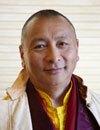
We don’t really understand the result of karma, the process of karma. We don’t really understand what the karmic causes of things are, or how it is that actions lead to their infallible results.
The Buddha said, “Only an omniscient buddha can really understand this.” He said, “Only with omniscient wisdom can one know the karmic cause of each and every feather that adorns the tail of a peacock.” With omniscient wisdom a buddha sees the karmic causes of each and every thing, such as the particular shape and color and tone of each eye on the tail of a peacock.
But we don’t know that; we have no idea what these things are. If we’re honest we can’t say we really know how good and bad actions lead to happiness and suffering. But what we do know is that they do. We can be certain that virtuous actions lead to happiness and that negativity, wrongdoing, leads to suffering. Even though we don’t fully understand it, we can still base our lives on it. We can still make the correct choices.
So how do you do that? How do you distinguish between virtue and wrongdoing?
He [Terchen Barway Dorje] says, “The rejection of selfishness and undertaking of altruism will make your thoughts and deeds pure.” The real basis for correct moral choices is ultimately quite simple: anything that is selfish, anything that you do for your own benefit despite its effect on others, is probably bad. Anything you do that is sincerely done with the good of others in mind is probably good. If you reject selfishness within you and cultivate altruism, this will make your thoughts and deeds pure. Your thoughts, the intentions with which we act, become pure if we are freed from selfishness or to the extent that we are freed from selfishness. With pure motivation one’s actions will become pure as well.
Therefore, in examining ourselves we need to really question both our intentions, “Why am I really doing this? Why am I contemplating saying this?” and its effect on others, “If I do this, or if I say this, what effect will it have on them?” If this is sincere, if you’re not faking it but you really try to reduce selfishness, all of your deeds of body and mind — your actions and your intentions and your thinking – will be virtuous.
[From a teaching on Little Song to Please the Dakinis given by Bardor Tulku Rinpoche in Battle Creek, Michigan on September 22, 2012. Translated by Lama Yeshe Gyamtso. The complete teaching is available as an MP3 download from the KPL Bookstore.]
